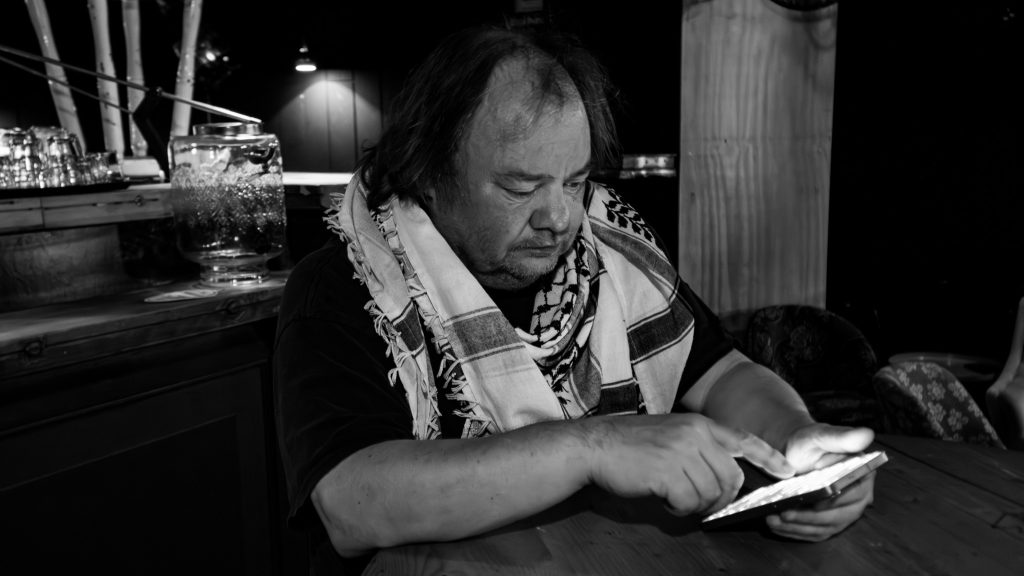

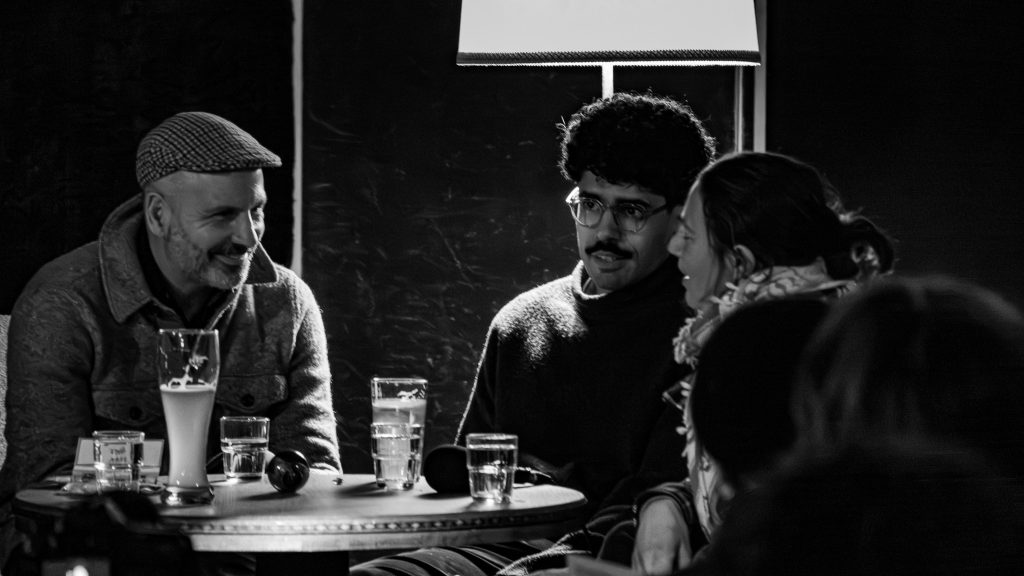
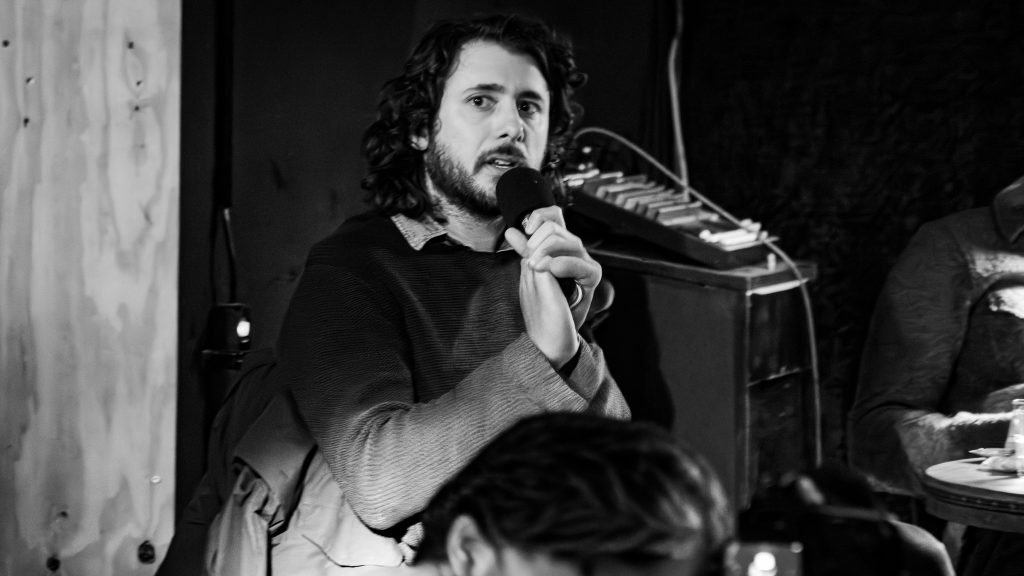
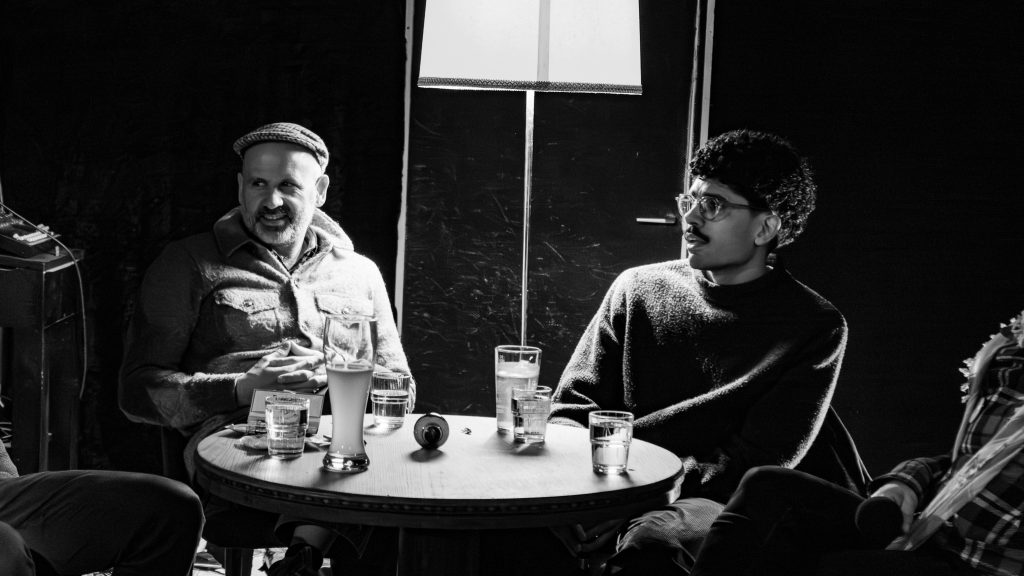

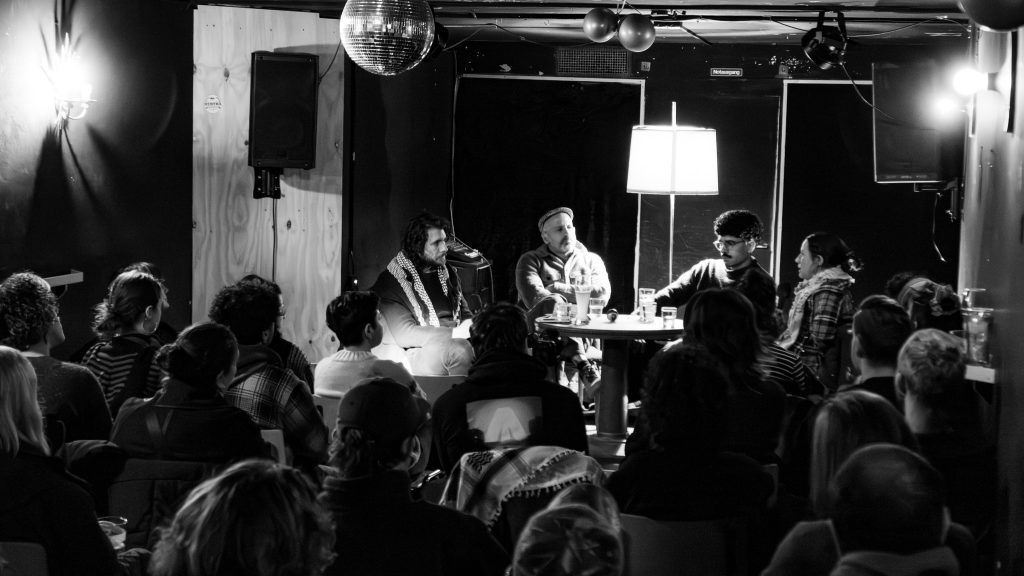
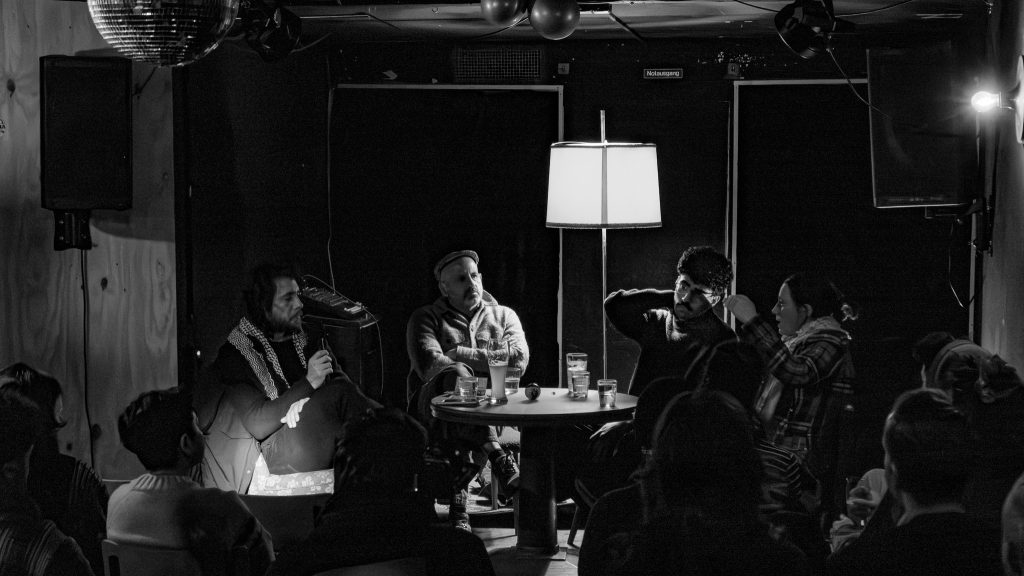
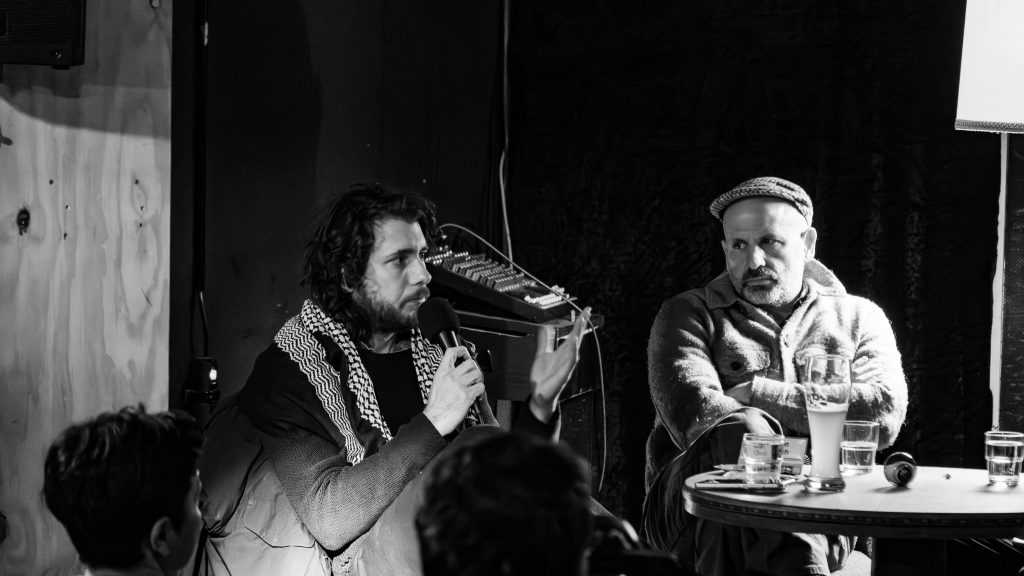
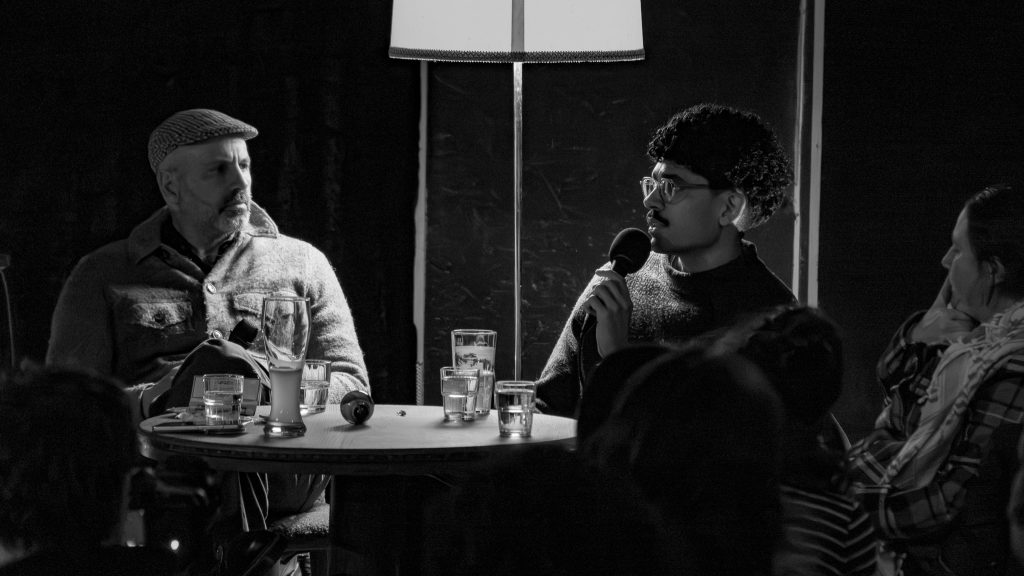
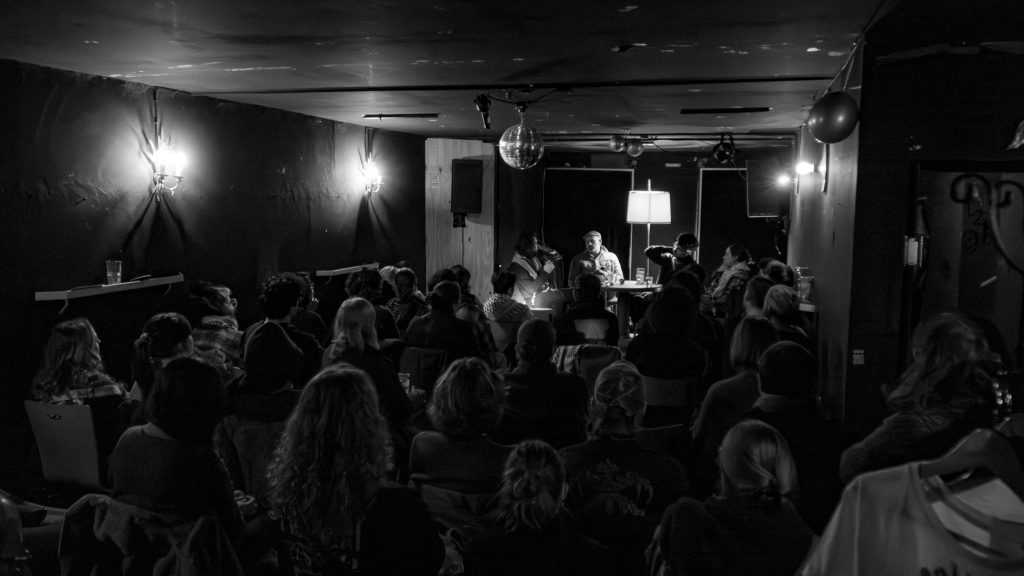
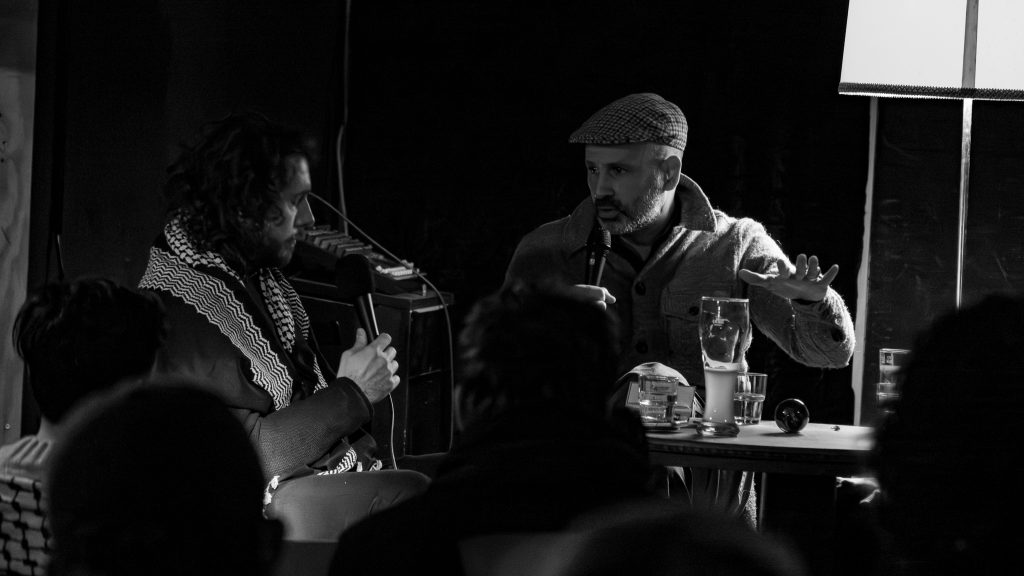
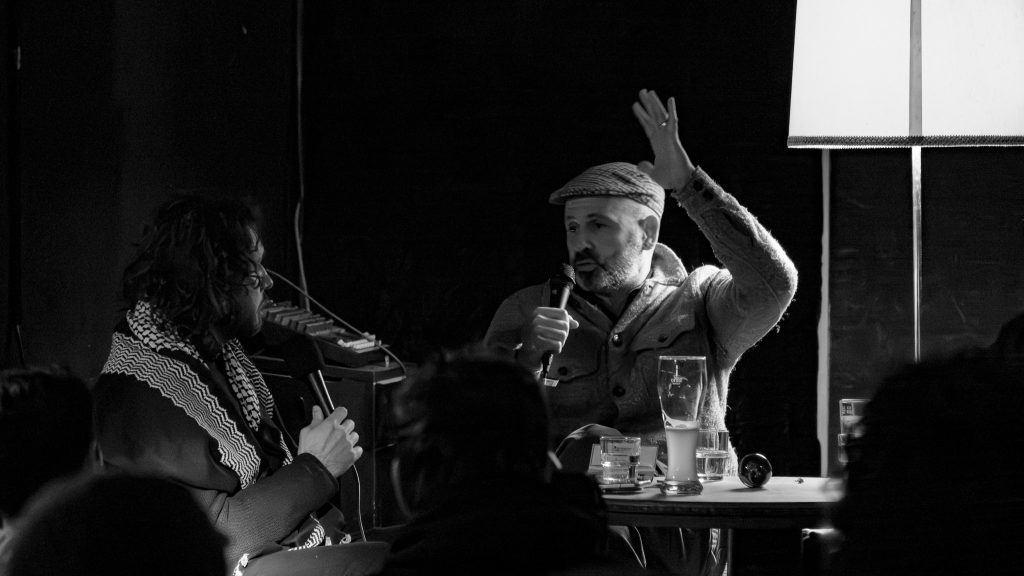

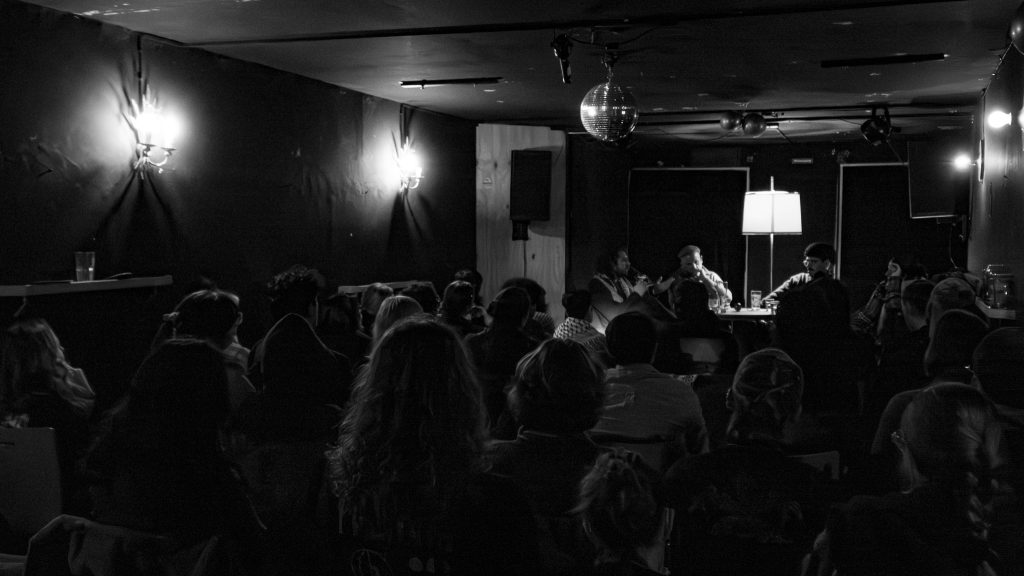
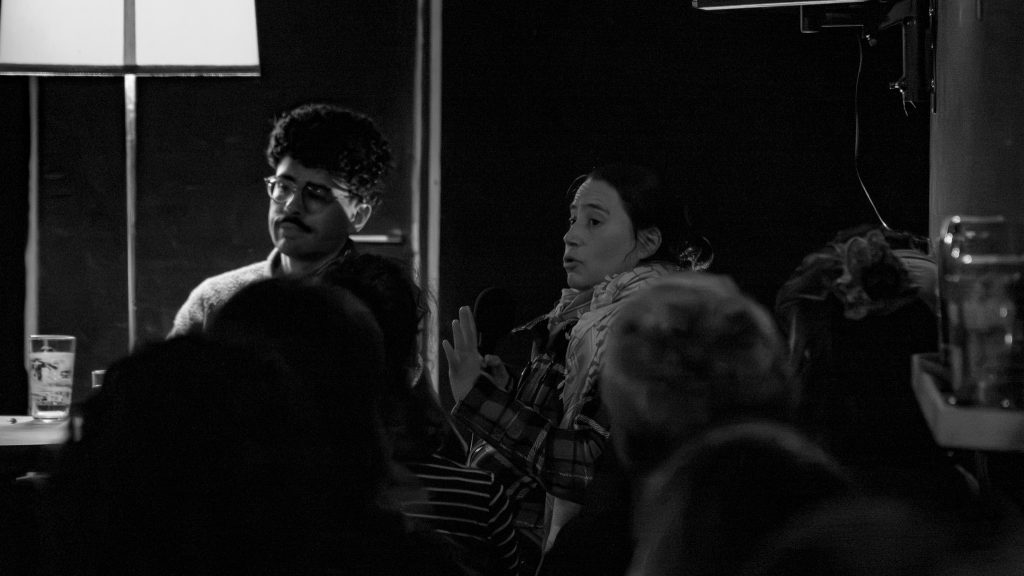
All photos: Cherry Adam
Collaboration between The Left Berlin and Corner Späti in Cafe Engles, 22 January 2026
Cherry Adam
23/01/2026
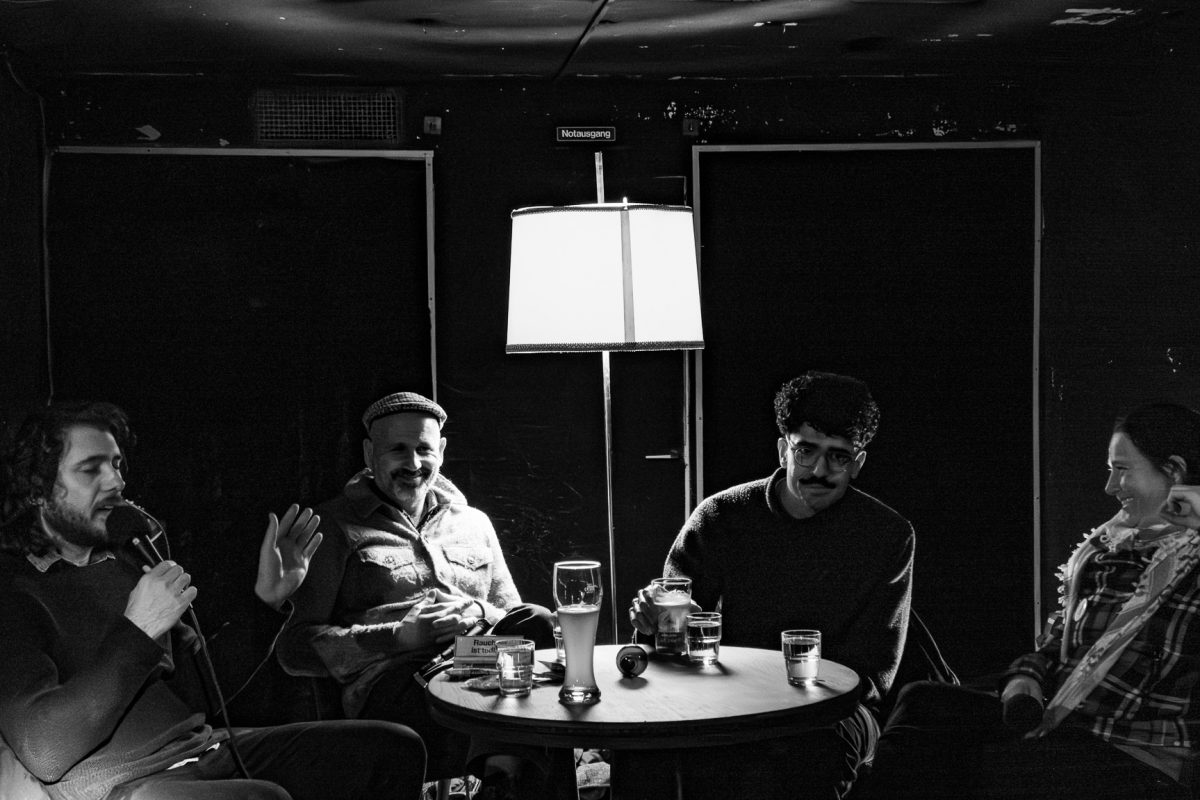
















All photos: Cherry Adam
Speech from the demonstration: “In Solidarity with the People of Iran”, Sunday 18th February, Berlin
Dorna Darabi
21/01/2026
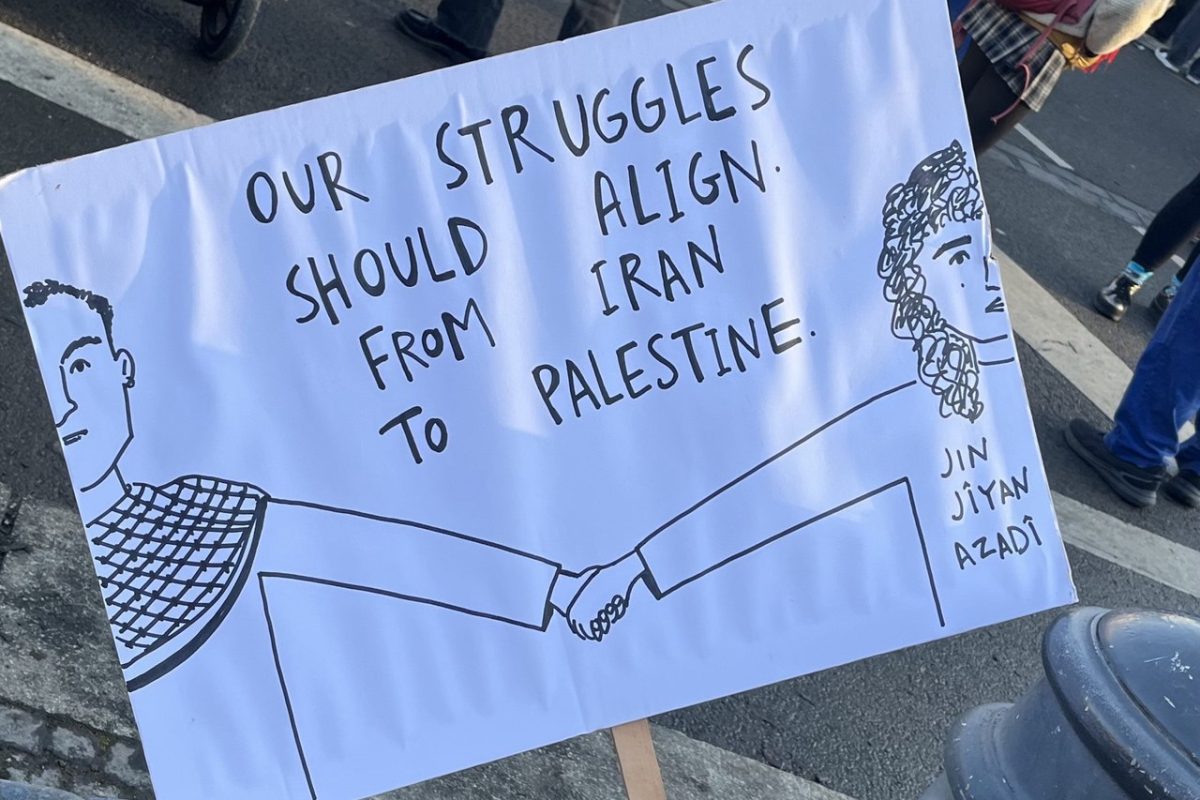
My friends,
I stand here as the daughter of an Iranian communist. My mother, a revolutionary, fought to bring down the Shah in 1979. She was one of the first, along with my aunt, to take to the streets in the historic mass demonstration against the new regime on March 8th 1979. My mother has fought relentlessly against the bloody regime for 46 years, and she has paid a heavy price for it: life underground, imprisonment, having to flee, and the trauma of these experiences. In 1988 she survived Saddam Hussein’s mustard gas attack on the Kurdish city of Halabja, which was made possible by German weapons. Her then husband, the love of her life, did not survive the armed resistance in the mountains. I’ve never even been able to visit my parent’s homeland. Our lives, our stories, are defined by this socialist fight against the regime and for a better world.
In the last 3 weeks we have seen, once again, how people take to the streets to protest the regime–millions of people are out there! It is the biggest revolution in the history of the Islamic Republic! These protestors have our full solidarity! We recognise ourselves in their struggle for freedom and equality, for a life of self-determination and dignity. We see that the struggles in Iran, Kurdistan, and Palestine, and the struggles here in Germany against war, rearmament, welfare cuts, racism, and genocide are one and the same fight!
A worker in Iran who can no longer afford potatoes has more in common with a worker here, who has to choose between paying for heating or food in the winter. We can’t sit idly by, watching our siblings in Iran, in Gaza, in Kurdistan, being massacred. It’s also not enough to simply commend the bravery of Iranians who risk their lives to fight the system: we must be ready to take up this struggle against our ruling classes! For this, we need revolutionary leadership, a socialism from below!
We say clearly: no to regime change! No to Pahlavi, a billionaire’s son who has never had to work a day in his life. They are not our allies, they are our class enemies! They promise freedom, but what they really mean is freedom for the rich to exploit the people of Iran as THEY see fit–the turban will be replaced by the crown and by the tie. We reject that completely! We don’t trust Pahlavi, Trump, or Netanyahu–we see their so-called democracy in Palestine! We explicitly reject Zionist “dirty work” in Iran–we say no to bombs, no to sanctions, liberation comes from below, not outside!
We fight for a free Iran, for an Iran controlled by the working classes themselves! The people whose labour power keeps society going should be able to freely and autonomously make decisions about their collective lives. The rich who profit from their labour shouldn’t be making these decisions! In Iran, there is a long tradition of workers’ councils. Time and again we see the power of the working people: in 1979 it was the workers in the oil industry who brought the Shah down. Therefore we also fully back the Tehran bus drivers’ statement, which clearly calls for an anti-capitalist alternative and stands against foreign intervention, and the Haft Tapeh workers, who demanded workers’ councils and the confiscation of state property back in 2017. Down with capitalist barbarism, long live socialism!
The workers united will never be defeated! Jin Jiyan Azadi! Marg bar dictator! Palestine Kurdistan, Intifada Serhildan!
Translated by Ciara Bowen
On 25th January 2011, National Police Day, mass protests erupted following the brutal torture and murder of young activist Khaled Mohamed Said. Under the slogan, “We are all Khaled Said,” demonstrators gathered to voice their outrage. One month earlier, the US-backed Tunisian leader Zine El Abidine Ben Ali had been overthrown by a popular mass movement, igniting a similar momentum in Egypt. A central demand during these protests was the insistence that President Mubarak should not be allowed to appoint his son as his successor.
By 28th January, the protests had convened at Tahrir Square, with demonstrators adamant about not leaving until their demands were fulfilled. Just two days later, workers from various sectors struck in solidarity with the youth of Tahrir. This escalation culminated in the infamous “Battle of the Camels,” during which government forces deployed armed thugs armed with live ammunition to attempt to quell the protests. However, these efforts were met with fierce resistance. By early February, approximately 300,000 workers were on strike, and on 12th February, after 18 days of relentless protest, Mubarak was ousted from power.
The Egyptian revolution did not arise overnight; it was the culmination of gradual socio-political changes that collectively spurred a movement against Mubarak’s regime. Notably, significant protests began in support of the Palestinian Intifada in Autumn 2000. In 2003, solidarity networks formed against the Iraq War, leading to the first major occupation of Tahrir Square. A wave of privatization in 2004 further fueled resistance and gave birth to the Kefaya (“enough”) movement against Mubarak.
By 2006, trade unions had joined the growing struggle. In December of that year, thousands of women textile workers in the Nile Delta town of Mahalla took to the streets, demanding that male workers join their strikes. This resulted in 24,000 workers striking in Mahalla, marking the onset of the largest strike wave in Egypt’s history. By 2007, strikes spread to the service sector and public health, and following the 2008 economic crisis, yet another surge of resistance emerged.
The Egyptian revolution faced defeat, first due to the Muslim Brotherhood’s accommodation with the state and later through the rise of counter-revolutionary General el-Sisi as Egypt’s president in 2013. Nonetheless, the spirit of the revolution endures. As revolutionary journalist Hossam el-Hamalawy, who documented the events, remarked in a recent interview with theleftberlin.com, “There are people who have seen this revolution, and they are still alive.”
Palestinian refugees among the victims of criminalization of asylum seekers in Greece
On Wednesday, 21st January, Ziad from Gaza will face a 25-years-long sentence in a court on Rhodes, Greece. He is one of the many asylum seekers criminalised by the Greek state – with EU’s full complicity – as a “smuggler”.
“I managed to leave Gaza for Egypt, and then to Turkey. I did my best there to obtain residency and family reunification, but I was unsuccessful. So, I continued my journey towards Europe, searching for safety for my family.” – writes Ziad in his statement.
In August 2024, he managed to reach Rhodes Island on a rubber boat together with other desperate people seeking safety. Once apprehended by Greek coast guard, he was accused of having held the rudder and put in pre-trial detention in a criminal prison in Athens. He has spent the last 17 months there. The day after tomorrow, he will face trial back on Rhodes, in which he can be sentenced to 25 years of prison for “smuggling”.
The government in Athens – as part of its migration deterrence policy – has been practicing criminalization of those fleeing wars, conflicts, the genocide, as well as extreme poverty and lack of any future at home. Upon their arrival “to safety”, a few random persons from every boat reaching Greek shores are arrested – usually without any evidence, access to translation or legal counsel – and put in prison.
Months and years pass. When a trial finally takes place, people are often offered a plea bargain (a plea deal) – an arrangement between prosecutor and defendant, in which the defendant pleads guilty in exchange for a more lenient sentence. Some of the criminalised in Greece accept it in fear that the “evidence” produced against them will condemn to the maximum punishment – 25 years of prison. Ziad has decided not to go down this way and face his destiny instead.
“From the moment I arrived in Europe, instead of finding justice, I was subjected to the greatest injustice. I was accused of a crime I did not commit and imprisoned. Every day in prison feels like a year, and I live in constant fear and anxiety for my family, whom I left behind under bombardment and suffering in Gaza.” – writes Ziad.
Ziad’s story is heart-breaking from its start. Back in Gaza, his eldest daughter fell sick and needed medical treatment not available there. Ziad was fighting to get her out of Gaza, but the Israeli regime did not allow it. She passed away in pain. He buried her and decided to leave to secure a better future for his remaining two daughters and his wife. He succeeded after months of trying – just days before the outbreak of the genocide.
“I visited Ziad in the prison in Athens. I have never met him before. He is a short, solid man in his 30s. He looks older than his age. A very gentle and calm person, a kind heart. He was smiling sadly in integrity and dignity as we exchanged about his upcoming trial” – says Eirini, an activist who has been supporting criminalised asylum seekers as part of Alma Community and ’50 out of many’ Initiative.
Greece’s law makes facilitating unauthorised entry a felony resulting in a ten-year prison sentence, with up to an additional 15 years for each person transported whose life was allegedly endangered. These measures “against” smuggling are in fact targeting those they claim to protect as great majority of the accused are people on the move.
Some of them steered or navigated a boat – for a short while or a whole journey – because they were coerced to it or simply to get themselves and others out of danger. In the absence of legal pathways of arriving and seeking asylum in the EU, driving a boat to Europe is an act of despair and an act of solidarity: no driver, no survivor.
“Ziad has been locked for 17 months. It is enough time to understand the reality. He is not in denial of the risk he will face on Wednesday” – continues Eirini. “Ziad is an asylum seeker from Gaza who wanted to find safety for his family. He should have never been criminalised”.
Ziad’s wife and two daughters remain in Gaza – they live in a tent in harsh winter conditions. Only a few days ago their tent collapsed on them.
To attend the trial or to support otherwise please contact: 50outofmany@gmail.com
Supporting groups:
The Lesson of Venezuela and the Conflict of Capitalism in its Most Ferocious Phase
Rezgar Akrawi
20/01/2026
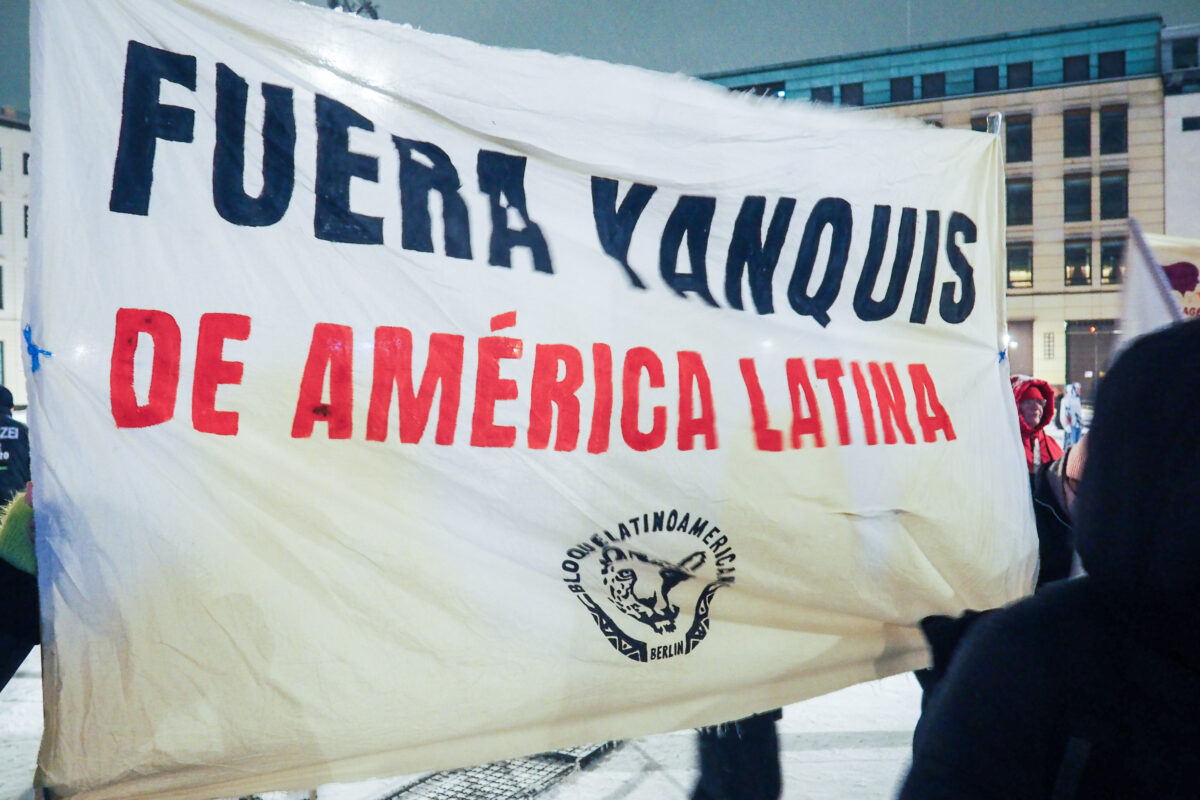
In the dawn of an ordinary day at the beginning of January 2026, the world awoke to shocking news: a brutal U.S. military aggression and the kidnapping of Venezuelan President Nicolás Maduro and his wife in a complex operation executed with supreme military and intelligence precision. Despite the direct military attack and intensive bombardment, the operation relied heavily on a massive employment of digital technology (as reported by Defense One, NBC News, and Just Security). Media coverage focused on political aspects without real attention to the pivotal role played by advanced technology. It was not just a traditional military intervention, but rather a comprehensive digital war that preceded the arrest by long months of planning and monitoring.
Before continuing, I would like to point out my reservation regarding the policies of the Maduro regime in suppressing dissenters, restricting freedoms, and tightening the grip on leftists and labor unions. Our critique of American capitalist intervention and the use of technology as a weapon for hegemony does not mean justifying the repressive practices of the Maduro regime against progressive forces and the labor movement. What we are highlighting here is the technological and strategic lesson that this incident provides to all leftist and progressive movements.
In this operation, the most advanced American satellite surveillance systems were used to track the movements of the Venezuelan leadership via satellites. Big data analysis extended to drawing accurate maps of government communication networks with all their complexities. The hacking of electronic systems was precisely planned to disable them at the decisive moment, making the Venezuelan leadership completely isolated from its bases. The employment of advanced digital techniques in analyzing millions of calls and messages was not just traditional espionage, but rather a complex operation to pinpoint the locations of leaders accurately and predict their next moves. The programmed manipulation of media and social media networks was an organized campaign to shape public opinion in favor of the intervention, and to portray the operation as “liberation”, not an aggression against the sovereignty of an independent state.
These are not scenarios from science fiction movies, but a documented reality we live today. The U.S. National Security Agency possesses the PRISM program, which was revealed by Edward Snowden and which monitors global communications without discrimination. Companies like Palantir Technologies provide highly advanced data analysis systems to the American intelligence establishment. The capitalist technological system today is capable of comprehensive surveillance and systematic tracking of political movements and political actors. The most dangerous thing is that there are many digital technologies and weapons that are still within secrecy, as was the case with the internet itself, which was not revealed to the public until years after its military and security use.
Technology as a Tool for Capitalist Control and Hegemony
What happened in Venezuela is not an isolated incident. It is an essential part of a comprehensive digital capitalist strategy that we have seen repeated in many places in the world. The clearest lesson from the incident of Maduro’s arrest is that capitalism in its current stage no longer relies only on traditional military force. It has developed a complex digital system capable of penetrating geographical borders, monitoring individuals and groups with amazing accuracy, and manipulating information and shaping public consciousness in ways that were not possible in any previous era. It is an invisible war, its battles take place in cyberspace and data servers, having proven more effective and less expensive than bombs and planes.
This reality poses a fateful question to the forces of the Left: how can liberation movements that still rely on traditional meetings, distributing paper leaflets, using unencrypted phones, and harnessing the internet in a primitive way, face a digital capitalist system with this level of development? The answer is clear and painful: it cannot, unless it decides to enter seriously and strategically into the technological field, not as passive consumers of capitalist technology, but as developers and innovators of independent digital alternatives that protect the struggle from penetration and suppression.
What we are witnessing today is a reproduction of historical class exploitation by more advanced and hidden means. This exploitation is no longer confined to factories or farms, it has extended to include the digital space itself. The algorithms of digital companies exploit manual and intellectual workers in ways more cruel than any human manager. These algorithms determine wages based on supply and demand at every moment, impose exhausting working hours without regard for health or family status, and issue automatic penalties without the possibility of appeal.
In the field of consciousness: the algorithms of giant platforms are used to shape the consciousness of billions of people. These algorithms systematically promote the ideology of capitalist consumption and the culture of individualism, while fighting leftist and progressive content through techniques of “reach reduction” and “shadow banning.” The consciousness of millions of young generations is shaped not through reading and critical thinking, but through algorithms that decide what they see and what they do not see.
In the field of surveillance and control: digital technologies are used today to deepen political and social control in ways that were not previously possible. Recognition and analysis systems allow tracking political activists and monitoring their behavior and networks with high accuracy. These technologies are exported to authoritarian regimes, transforming digital and public space into a permanent field of surveillance.
The Historical Stake for the Left, Toward a Liberatory Digital Revolution
The technological factor is no longer just a secondary addition in the Left’s battle against capitalism. It has become an essential condition for survival, effectiveness, and influence. Facing this reality cannot be limited to criticism, but requires specific positions and policies, transcending the exposure of capitalist hegemony to working on dismantling it and redirecting technology toward serving the general masses. Developing leftist capabilities in the technical field is a vital necessity no less important than developing political and organizational capabilities. Just as the forces of the Left cannot rely on capitalist media and seek to build their independent media, they must also work on building their independent technological alternatives, whether in social networks or digital tools and others.
What the current digital revolution reveals is that we live in a historical moment in which the contradictions between the massive development of the productive forces and capitalist social relations, which are no longer capable of containing this development, become clear. The struggle in digital space must transform into an organic extension of the socialist struggle on the ground, and not just a separate arena. Linking the technological struggle and the class struggle is essential, because digital hegemony is just an extension of the hegemony of capital.
The possible solution now is to develop open-source, transparent systems, managed democratically with societal controls, in addition to pushing toward enacting international laws that regulate the work of digital technology and ensure its service to society as a whole. But this is not enough. The radical solution is building real leftist technological alternatives with progressive orientations and societal ownership, through which this technology is snatched from the grip of the market, and employed in dismantling relations of exploitation, and contributing to building a new, more just and humane society.
The Left’s use of current digital technology must be accurate, deliberate, and cautious. Applications developed within a capitalist environment cannot be trusted without deep critical awareness. Extreme caution must be taken when dealing with sensitive data and information, for the unstudied exploitation of these tools may lead to a security breach or information leak that exposes leftist organizations to danger. Therefore, it is necessary to develop advanced digital security protocols, adopt more independent open-source applications, and train members on digital security practices.
The Decisive Historical Moment for the Left
While what happened with Maduro is not a singular event, it is a sharp warning to all progressive regimes and leftist movements in the world. It is a practical announcement that the digital battle has turned into a central arena of class struggle. What happened in Venezuela reveals that digital capitalism has come to rely on technical vulnerabilities that grant it the possibility of influencing the stability of progressive regimes, attempting to paralyze their leaderships, and betting on engineering the consciousness of their societies digitally. The danger does not affect Venezuela alone, but it could extend to threaten every leftist and progressive experience. We are in front of a new stage of class struggle, in which technology and artificial intelligence are used as a strategic weapon to strike leftist movements in their cradle. The global socialist struggle today is directly targeted by digital penetration, comprehensive surveillance, and the prior drying up of any potential revolutionary act.
The basic question: Are we, as leftist and progressive forces, really ready to fight this digital war? Do we have the courage to rebuild the Left intellectually, organizationally, and technically? Are we ready to overcome fragmentation and division, and understand that the fate of every progressive experience has become linked with the fate of others? The historical moment does not forgive, and digital capitalism does not wait for our hesitation. Either we engage with awareness and struggle in this battle, and reformulate an alternative socialist project capable of facing the digital age, or we are left on the margins of history. Accepting the latter fate is inevitable extinction. The true historical stake for the liberation project is that it transforms into a digital project with awareness and organization.
Digital technical knowledge must become an integral part of contemporary leftist culture, and here the vital role of youth emerges as a vanguard for this transformation. We must build leftist technical cadres, investing the energies of young generations in developing alternative digital tools, and social networks that are not subject to the algorithms of capital. We must understand the programming code as we understand the political text.
This effort requires coordination and common action globally through building digital internationals and alliances whose goal is to develop the digital struggle of the Left in the whole world. Building these independent technological alternatives is fraught with dilemmas: the dilemma of depending on knowledge developed in the bosom of the capitalist system itself, the dilemma of the massive resources required, and the dilemma of coordination between feuding leftist forces. Therefore, this project must be a strategic tactic that starts from the critical use of available tools, building technical solidarity networks, and striving to develop an alternative core in the spaces provided by open-source technology, with the recognition that it is a long-term cumulative project.
The Left that had the noted role in promoting freedoms, equality, and justice can overcome this current state. Let this digital battle be a moment of new birth for an electronic digital Left merged with field struggle, more daring and radical and scientific. The battle for control over digital technology is not a technical battle only, but a battle for the future of humanity itself. Digital socialism, in this sense, is not a choice among choices. It is the existential condition for the survival of the socialist project itself in the twenty-first century.